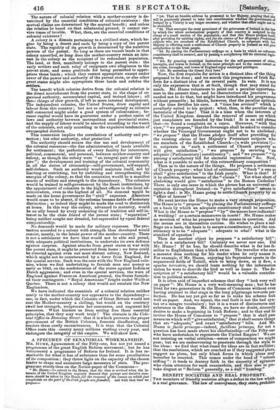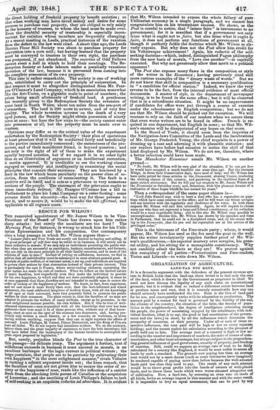BENEFIT SOCIETIES AND REAL PROPERTY. THE members of friendly societies
allege a defect in the law which is a real grievance. The law of conveyance, they state, prohibits
the direct holding of freehold property by benefit societies ; so that when working men have saved money and desire for some
urpose to purchase real property, they are obliged to rely solely p the honesty of trustees, to whom the land must be made over. &I3 en the doubtful security of trusteeship is especially incon- venient for societies whose members are frequently changing. At a recent meeting in Leeds, practical instances of the vexation from the defect in the law were cited. A short time ago, the Leeds District Flour Mill Society was about to purchase property for conversion into a corn mill but having learned that the property must be conveyed to trustees in their own right, the purchase was postponed, if not abandoned. The societies of Odd Fellows cannot erect a hall in which to hold their meetings. The Re- demption Society at Leeds labours under a peculiarly vexatious operation of the law, because it is prevented from coming into the complete possession of its own property.
This case is rather remarkable. The society is one of working men, established to carry out the principle of cooperation. In that respect it must be altogether distinguished from Mr. Fear-
us O'Connor's Land Company, which is an association somewhat like the Art-Union' on a gigantic scale in point of numbers ; the prizes being small allotments of freehold land. A gentleman has recently given to the Redemption Society the reversion of some land in South Wales, about ten miles from the sea-port of Carmarthen. The land is 22/3 acres in extent, and of very fine quality. The whole reversion accrues on the death of a very aged person, and the Society might obtain possession of ninety acres at once: but here the law steps in—the society cannot enter into possession at all, but the property must be made over to trustees.
Opinions may differ as to the critical value of the experiment undertaken by the Redemption Society: their plan of operations at least promises that it will be conducted fairly and beneficially to the parties immediately concerned; the earnestness of the pro- moters, and of their munificent friend, is beyond question ; and not only is the right of all of them to make the experiment equally beyond question, but if we regard it in no other light than as an illustration of argument or an intellectual recreation, it merits approval. It is creditable to see the working classes engaged so earnestly and intelligently in examining the social principles that concern their existence. They are hindered by a fault in the law which bears peculiarly on the poorer class of so- cieties, from the costliness of surmounting it. The fault is a positive evil in itself, and it acts as a grievance to very numerous sections of the people. The statement of the grievance ought to cause immediate redress. Mr. Feargus O'Connor has a bill in Parliament to place his Land. Company on a surer footing : some persons doubt his sincerity—the best way for those persons to test it, and to secure it, would be to make the bill effectual, and applicable to all cognate cases.



























 Previous page
Previous page